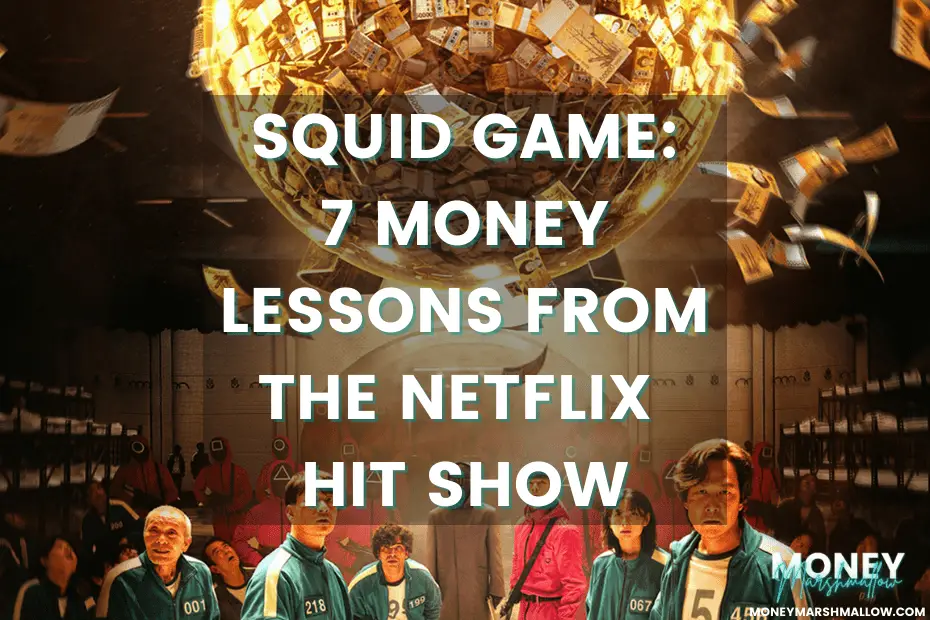What happens when debt-ridden individuals risk their lives playing children’s games for a life-changing amount of money?
This is the premise of the latest Netflix smash hit show, Squid Game. The South Korean series has been topping the chart on Netflix since its release in September. In fact, it’s acquired the position of the best-performing show in Netflix’s history so far.
Squid Game is all about the consequences of bad financial decisions. Therefore, we’d hope some of the 111 million viewers clocked the wealth of personal finance learnings from the show. Let’s recap some of the important Squid Game money lessons we can apply in our daily lives.
***Spoiler alert***
Money lessons from Netflix's Squid Game
1. Prioritise paying off debt
Debt and the risks of it are probably the most obvious money lesson in Squid Game. At the end of the day, all the contestants are ready to risk their lives due to financial difficulties.
In the first episode of Squid Game, you are introduced to the main character, Seong Gi-hun. He’s an adult man who uses his elderly mother for financial support, steals her debit card and withdraws money to bet on horses. Although he wins some money, instead of paying off his debt, he runs away from the debt sharks and gets robbed.
Don’t be like Seong Gi-hun. If you have debt, do your best to pay it off. This will help support a stronger credit score and should start to reduce your stress. While all debt is not necessarily bad (such as a mortgage or student loan), it’s important to plan how you will be paying off any debt you take.
2. Build an emergency fund
All of the Squid Game contestants take part in the game because they feel they have no other options. There are many reasons for their debt from medical issues to gambling and bad investments. Most of the contestants have never learned the art of saving. However, saving is the one thing that could have saved them from the crushing levels of debt they find themselves in.
Saving buys you the freedom to choose better options for your future. It will also come in handy if you have an emergency. Start building an emergency fund, ideally with three to six months’ salary in cash. Saving this can take a while so even a smaller amount like £1,000 is a good starting point. This will ensure that in case of unexpected expenses, you can easily access cash and won’t have to use a credit card or take a loan.

3. Never underestimate the importance of insurance
In Episode 2, Seong Gi-hun’s mother ends up in the hospital and needs surgery. However, they can’t afford the cost of the required treatment as Seong Gi-hun had cancelled the insurance payments and spent the money on gambling. So, if he had kept paying for insurance, he could’ve helped her mother get the medical help she needs. This is why having insurance is really important.
Remember that you’re just one bad day away from the worst-case scenario. Therefore, consider protecting yourself and your family financially with an insurance policy. If you live in the UK, you might think health insurance isn’t necessary due to our free healthcare. Even then, it can be beneficial to consider taking income protection insurance, critical illness insurance or life insurance. This type of policy is another type of investment; it’s a safety net that will maintain your and your family’s standard of living should something happen.
Related: Life insurance for diabetics: Common questions answered
4. Don't put all your eggs in one basket
Episode 3 teaches us another important Squid Game money lesson: diversification or “don’t put all your eggs in one basket” as Cho Sang-woo says before the Honeycomb game. This lesson can apply to all aspects of personal finance from investing to building multiple streams of income.
Diversification means having a wide range of different assets to spread risk. When investing, it’s better to diversify your portfolio rather than put all your money into one company. This means that no matter how the market is performing, the better-performing investments will offset the poor-performing ones.
Diversification can also apply to savings or income streams. Splitting your savings across multiple accounts may allow you to take advantage of extra benefits or protect you if you can’t access one account for a while. Finally, building multiple income streams in addition to your main salary can have various benefits. Additional streams of income can provide extra financial security and help you reach your financial or savings goals faster.

5. Don't fall for "get rich quick" schemes
When it comes to money, if it sounds too good to be true then it probably is. This is a lesson we’ve already learned from another Netflix series Money, Explained.
Whether it was Gi-Hun’s gambling addiction, Sang-Woo’s abnormally high-risk investments or the Squid Game salesman’s promise of winning easy money, the main driving force behind their actions is to get rich quickly with little to no effort.
Huge, guaranteed or easy returns on a particular stock, cryptocurrency, NFT or property don’t exist. The line between gambling and investing can sometimes be narrow. But if you do your research properly, it will ensure you are actually investing. If you make a well-calculated decision and avoid being carried away by FOMO or greed, you can greatly help lower your overall portfolio risk.
As we know by now, there really is no such thing as “getting rich quickly”. Not unless you are due to inherit a fortune or win the lottery. For most of us, these scenarios are unlikely to happen any time soon. Wealth takes time to grow so patience and consistency are key.
Related: Why Do Lottery Winners Go Broke?
6. Compare and analyse your options
In episode 7, the Squid Game contestants were tasked to cross a bridge from a dizzying height by jumping on platforms that are either made of fragile glass or strong tempered glass. While most players plummeted to the concrete floor below for choosing the wrong platform, one player was able to use his experience as a glassmaker to choose the right platform to jump on.
So one thing to take away from this episode is the importance of informed decisions. When you’re faced with a decision (choosing your first credit card, investments, starting a business etc.), it’s essential to do your due diligence first before taking any financial responsibility. Consider all possibilities before deciding. Weigh the options against each other carefully for their pros and cons so you don’t regret your choice later on down the line.

7. Know when to seek financial support
In Squid Game, many characters live in denial about their financial situation or try to solve problems alone, only to dig themselves into a deeper hole. The secretive character Kang Sae-byeok had a tough time trusting people around her for the majority of the game. In Episode 8, she finally learned to ask for help from Gi-hun after she received a fatal wound.
Sadly, most people don’t share their financial hardships before it’s too late. Asking for help may feel difficult or even embarrassing, but you should learn to ask for help from the people around you if you need any support. It’s also good to understand when help from a financial professional might be needed.
Final thoughts: Squid Game money lessons
Who knew we could learn so many valuable money lessons from such a grisly show? Squid Game showed us how all our financial choices, both good and bad, can have a significant impact on our futures. While all these Squid Game money lessons are very important, let’s not forget perhaps the most valuable learning from the show: money isn’t everything in life – and certainly not worth dying for.


I have to be honest, after watching the show, i do not understand what was the hype about. However, i can understand the financial lessons you presented in this blog. Love your perspective.
Thanks for sharing your feedback, Kevin! I’ve actually heard other people saying the same. I personally liked it but completely understand it’s not for everyone! The money lessons from Squid Game on the other hand are something everyone should know about! 🙂